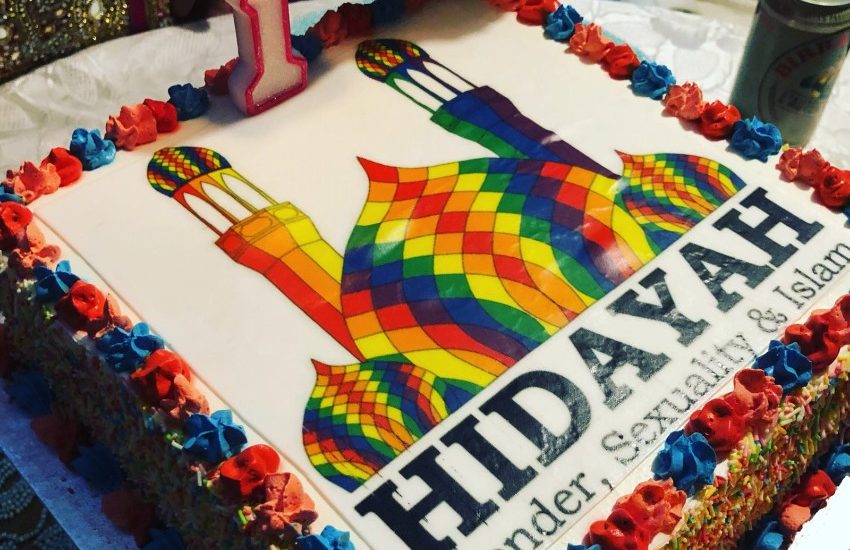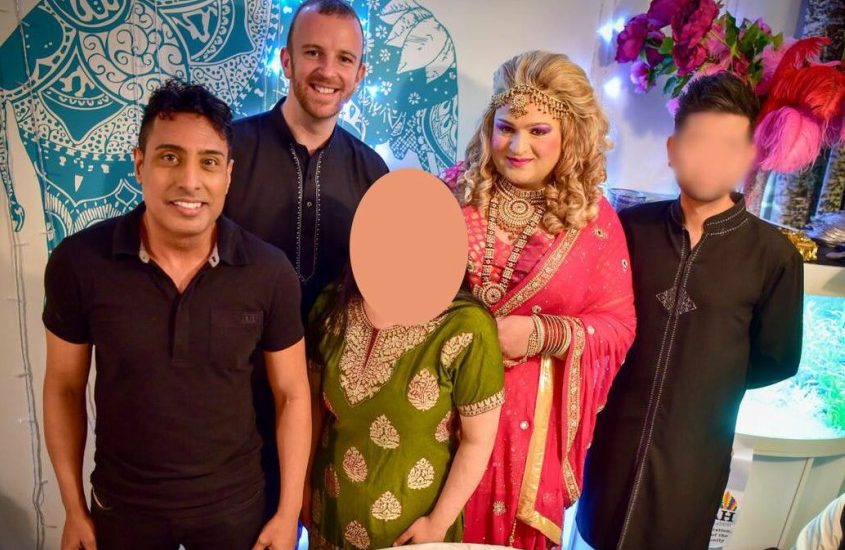One day when the mum of bisexual academic, Drew Dalton, was doing some cleaning she stumbled on some of his ‘hidden’ publications. But she never told her son what she found in his house that day.
It wasn’t until Dalton later ‘came out’ as Muslim that she confessed she had a feeling about his religious inclinations.
She confessed: ‘Well I think I kind of knew, I found your stash of Korans.’
‘Honestly, it felt like you’re hiding you porn as a 15-year-old. There was that whole coming out again,’ Dalton told Gay Star News.
‘But she’s been brilliant.’
The 38-year-old is a long time social justice campaigner having worked with veteran LGBTI activist, Peter Tatchell. Dalton now works as a lecturer in sociology at the University of Sunderland. Using his years of grassroots campaigning, Dalton is also the chair of Hidayah, a support organization for LGBTI Muslims.
Whether you’re celebrating today or tomorrow, from eveyone here at Hidayah, we wish you a pleasant & joyous Eid. Eid Mubarak. #LGBT #LGBTMuslims #EidMubarak #EidAlAdha #UK #London pic.twitter.com/DQu6gB3e82
— Hidayah (@HidayahLGBT) August 21, 2018
Dalton had kept his religion secret from his mum because he believed there was no ‘good time’ to become a Muslim, thanks to all the negative media representations of the religion.
Growing up in a very working class mining town in north eastern England, Dalton’s decision to convert to Islam did not go down too well. The reaction of his friends and family to his ‘coming out’ as a Muslim, was far more ‘difficult’ than when he came out as bisexual at the age of 18.
‘I felt that I was coming out twice. Islam was a lot harder for me because you kind of internalize the Islamophobia that exists,’ Dalton said.
Life as an LGBTI Muslim
After the initial shock, Dalton’s family and male partner embraced his decision. But some of his other friends were not so understanding.
‘When I came out on social media, I started to then feel the feedback,’ he said.
‘I was getting remarks like “how can you support a religion which kills gay people” and all this stuff.’
People told Dalton he had converted to the most ‘horrific religion’ and even lost some friends who couldn’t stand his decision.
Becoming Muslim
Dalton came to Islam as a person who always was interested in religion. He had flirted with Buddhism because it seemed the best option for an LGBTI person.
‘I could have my sexuality, I could have my religion… I could reconcile the two. But that left a gap because I still believed in God, but Buddhism is not a God based religion.’
While teaching Religious Education in a ‘very rough white working class area’, Dalton started to learn about Islam. A mosque had opened up nearby and Islamophobia was spiralling out of control in the community. So to ease tensions he introduced Islam to the curriculum, organized trips to the mosque for his students and tried to create a better understanding of the religion.
During this time, Dalton’s interest in Islam piqued. But he didn’t fully embrace the religion until one of his closest friends died tragically.
‘That’s the bit that got me more motivated. I’d lost my best friend, I was out of depth about my place in the world. You start to question a lot more things, ‘ Dalton said.
‘I needed some solace, so I started to think more about Islam.’
But now he’s devout and prays five times a day. Dalton even said the shahada – declaration of his Islamic faith to become a Muslim – to another gay Muslim.
‘It was brilliant to do,’ he said.
Drew Dalton (center back) celebrates Hidayah’s first birthday along with other members of the organization. | Photo: Supplied
Challenging misconceptions
Telling LGBTI Muslim people that they can’t belong to both communities does ‘disservice’ to people living in those intersections, according to Dalton.
While many people believe that it against Muslim law to be gay, the religion actually has a long gay history.
‘You can be both and you can be very proud to be both,’ he said.
He also called on the LGBTI community to be allies for their Muslim counterparts and not to isolate them.
‘We’re a minority within a minority. We really need people who aren’t a Muslim to defend us,’ Dalton said.
Dalton wants people to understand that religion and sexuality can co-exist and change will only come from within.
‘I think there’s an issue in the LGBTI community. We’ve got so used to the narrative of religion being wrong, that it’s oppressed people… we’re trapped in that narrative now,’ he said.
‘Just say we’ve got a young Pakistani lad who’s been raised a Muslim that comes out at the age of 18, where does he go? Does he go back to his own Pakistani community and face the cultural beliefs that it’s wrong?
‘Or does he go to the gay community who tells him “you can’t be Muslim because it’s a religion that oppresses us”.’
Biphobia
Dalton is no stranger to copping criticism for his identity. He knew from the age of eight that he was attracted to both boys and girls. He also knew it wasn’t ‘a passing phase’.
But facing biphobia his whole life has helped Dalton develop a thick skin. One that he would need trying to navigate the world as a bisexual, white Muslim.
‘I always felt I stood out a little bit on the ‘gay scene’ because I was bisexual,’ he said.
‘Add on the Islam and you’ve got a hard road ahead of you.’
Realizing the challenges ahead of him is what attracted to Dalton to Hidayah, he knew finding a support network would be critical to his survival.

Hidayah turns 1. | Photo: Supplied
Ummah
Knowing that he might need support as a new convert to Islam, some of his gay Muslim friends introduced him to the LGBTI ‘Ummah’.
‘It’s complex, it’s wide ranging,’ Dalton said of the LGBTI Ummah.
In Islam, Ummah means community and until his friends opened his eyes, Dalton had no idea how big and diverse the world’s LGBTI Muslim community was.
After a friend added him to a private chat with hundreds of other LGBTI Muslims, Dalton realized there must be many more people around the world like them.
He reached out to Hidayah offering his services as a volunteer and soon found himself on the committee. Dalton helped developed the organization’s website, he ran their social media for a bit and helped build Hidayah into the impressive network it is today.
‘In that space, I found myself a bit more. It was very cathartic,’ Dalton said.
‘It was the instant friendly approach… “you’re part of the Ummah and welcome to the community”.
It’s very important that Hidayah continues to grow because Dalton knows there are many LGBTI Muslims out there who are not getting the support they need.
He wants to say ‘salaam’ to any LGBTI Muslims out there and invites them to join his Ummah at Hidayah.







